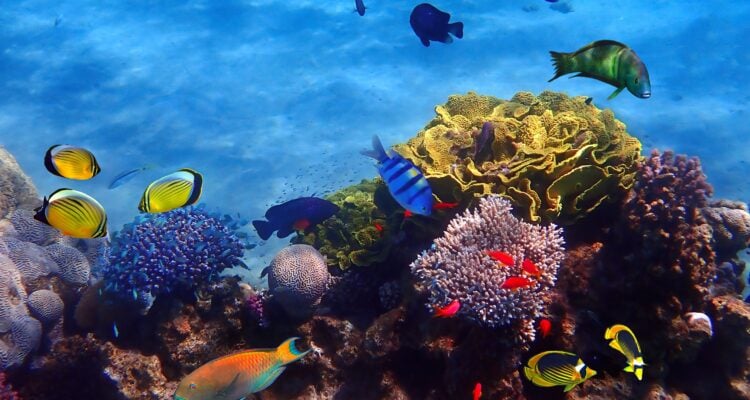The researchers found that during the summer, water temperatures in the Gulf of Eilat reached a record high of 31.9°C, with daily peaks consistently over 30°C for two months.
By Pesach Benson, TPS
The vibrant coral reefs in the Gulf of Eilat are showing signs of distress stemming from an unprecedented increase in seawater temperatures, Israeli scientists warned on Tuesday.
For the first time, a significant bleaching event has been documented in this area, indicating the corals’ response to an unprecedented increase in seawater temperatures.
Coral bleaching is a stress response that corals undergo when exposed to environmental changes, especially increases in water temperature.
Corals have a symbiotic relationship with tiny algae called zooxanthellae that live inside their tissues.
These algae give corals their beautiful colors and, more importantly, provide up to 90% of the energy corals need through photosynthesis.
However, when the water becomes too warm, corals become stressed and expel these algae. Without the algae, the coral tissue becomes transparent, exposing the white skeleton underneath, which is why the process is called “bleaching.”
The bleached corals look pale or completely white. Prolonged heat stress can eventually lead to coral death.
A study was conducted by Dr. Assaf Zebuloni, an ecologist specializing in the Gulf of Eilat at Israel’s Nature and Parks Authority, and researchers Dr. Yonatan Shaked and Prof. Maoz Fein from the Inter-University Institute of Marine Sciences in Eilat noted that the extreme temperatures observed this year disrupted the delicate balance that allows coral to thrive. The findings were recently published in the peer-reviewed Ecology and Environment journal.
The researchers found that during the summer, water temperatures in the Gulf of Eilat reached a record high of 31.9°C, with daily peaks consistently over 30°C for two months.
According to National Oceanic and Atmospheric Administration satellite data, the cumulative heat stress in the Bay of Eilat was 3.75 times the threshold that typically triggers severe bleaching events in other parts of the world.
In the Gulf of Eilat, corals have developed a unique resilience, adapting to the warm waters of the southern Red Sea.
But only heat-resistant corals have managed to migrate north to the Gulf of Eilat, where the borders of Israel, Egypt and Jordan converge.
However, this summer’s temperatures may have surpassed the threshold for the corals.
“Even with the remarkable resilience of Eilat’s corals, it appears they, too, have a limit,” said Zebuloni. “It’s likely that the reef system has reached a critical point this year.”
Local factors further exacerbate the challenge. Excess nitrates in the northern Gulf of Eilat, discharged from Israeli desalination plants and aquaculture, have combined with the heat to threaten coral health.
Elevated nitrate levels make corals more vulnerable to bleaching, according to Dr. Zebuloni. He warned that any increase in these pollutants could further endanger the coral reefs.
“The combination of high temperatures and nitrate pollution is critical to coral sensitivity,” he explained. “Given the unpredictable frequency of heat waves and rising sea temperatures, the risk of severe bleaching events has intensified.”
The Nature and Parks Authority is currently surveying the affected coral populations to assess the scale of the bleaching and determine recovery and mortality rates.
While the damage thus far does not appear to be catastrophic, experts are cautious, noting that once a reef reaches a tipping point, recovery may be difficult or even impossible.
The situation in Eilat could follow patterns seen in other parts of the world, where reefs subjected to sudden, extreme stress have struggled to rebound.
“Israel has a responsibility to safeguard this unique ecosystem,” said Dr. Zebuloni. “Protecting these reefs is crucial for preserving their resilience and ensuring they remain an international asset for future generations.”





